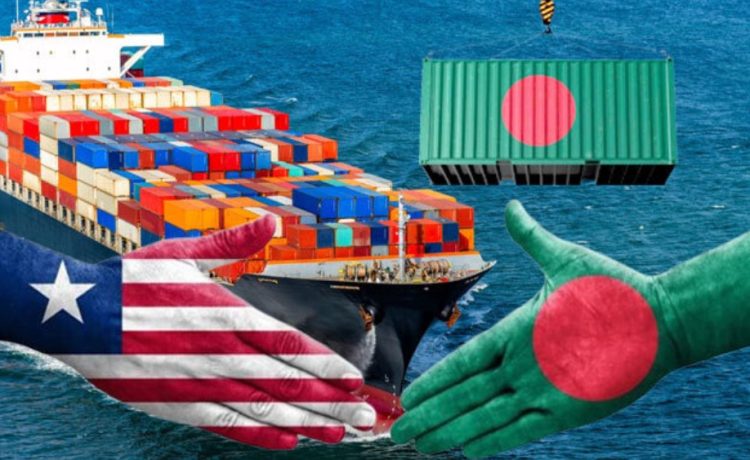The United States has imposed an additional 25 per cent tariff on Indian imports over its continued purchase of Russian oil, bringing the total tariff rate on certain Indian goods to 50 per cent.
This significant trade measure could open a strategic window of opportunity for Bangladesh, particularly in boosting exports to the US market and attracting greater foreign direct investment (FDI).
With Indian goods facing higher costs in the American market, US buyers may increasingly look to alternative suppliers – and Bangladesh is well-positioned to benefit.
RMG: The key growth sector
The ready-made garment (RMG) sector accounts for around 80 per cent of Bangladesh’s total export earnings, and the United States is its largest single export destination. In the 2024–25 fiscal year, Bangladesh’s garment exports to the US rose by approximately 14 per cent. In the first five months of the current year alone, that figure has surged by over 21 per cent.
The new 50 per cent tariff on Indian garments makes them less competitive in the US market, while Bangladesh currently benefits from a more favourable 20 per cent tariff rate. This pricing advantage could encourage American importers to shift sourcing towards Bangladeshi manufacturers, offering a timely boost to the country’s flagship export industry.
Leather goods: Emerging potential
Bangladesh’s leather products – particularly footwear and handbags – are gaining traction in international markets. With potential disruptions to Indian leather exports due to US tariffs, Bangladesh has an opportunity to fill the gap.
The country already exports leather goods to Germany, Japan, and South Korea. A coordinated push by both government and private sector stakeholders to target the US market could significantly expand export volumes in this sector.
Agricultural exports: A growing opportunity
Bangladesh currently exports frozen fish, shrimp, vegetables, and fruits primarily to the Middle East and Europe. However, if Indian agricultural exports face higher barriers in the US, Bangladeshi producers could step in to meet demand – especially for high-value items like frozen shrimp and fish.
To capitalise on this, however, exporters must ensure consistent product quality and obtain internationally recognised certifications such as HACCP, FDA compliance, and Global GAP.
IT services: A rising alternative
Bangladesh’s information technology sector has seen rapid growth over the past decade, with rising exports in freelancing, software development, and IT-enabled services. As Indian IT firms face potential challenges due to US trade policies, Bangladesh could emerge as a competitive alternative for American companies seeking cost-effective digital solutions.
The country’s young, tech-savvy workforce and relatively low labour costs offer a compelling value proposition in the global IT outsourcing market.
Bangladesh as a new FDI destination
The US tariff policy may prompt multinational companies to reconsider India as a manufacturing base. In this shifting landscape, Bangladesh could emerge as a preferred alternative in South Asia – particularly as firms continue to diversify supply chains away from China.
With its strategic location, growing infrastructure, and expanding export base, Bangladesh has the potential to become a key third-country hub for global production networks.
Challenges and the way forward
While the situation presents a clear opportunity, Bangladesh is not without competition. Countries such as Vietnam, Pakistan, and Indonesia are also poised to benefit from any reconfiguration of global trade flows.
To stay ahead, Bangladesh must act swiftly to improve product quality, enhance production efficiency, and upskill its workforce. Experts stress the need for faster progress in policy transparency, ease of doing business, reliable energy supply, and expansion of Export Processing Zones (EPZs).
Analysts agree: if Bangladesh can implement timely reforms and strengthen its export ecosystem, it can turn this geopolitical trade shift into a lasting economic advantage.






